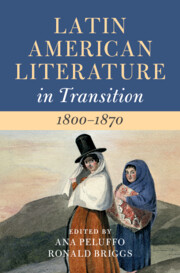Book contents
- Latin American Literature in Transition 1800–1870
- Latin American Literature in Transition
- Latin American Literature in Transition 1800–1870
- Copyright page
- Contents
- Figures
- Contributors
- Acknowledgments
- Introduction
- Part I Aesthetics of Disorder
- Part II Affective Communities
- Part III Intersectional Subjectivities
- Chapter 15 Shame, Enslavement, and Identity
- Chapter 16 Narratives from Enslavement
- Chapter 17 Masculinities and Racial Ambivalence
- Chapter 18 Childhood, Race, and Gender
- Chapter 19 Uncle Tom’s Cabin in Brazil
- Part IV Transoceanic Consciousness
- Index
- References
Chapter 19 - Uncle Tom’s Cabin in Brazil
from Part III - Intersectional Subjectivities
Published online by Cambridge University Press: 24 January 2023
- Latin American Literature in Transition 1800–1870
- Latin American Literature in Transition
- Latin American Literature in Transition 1800–1870
- Copyright page
- Contents
- Figures
- Contributors
- Acknowledgments
- Introduction
- Part I Aesthetics of Disorder
- Part II Affective Communities
- Part III Intersectional Subjectivities
- Chapter 15 Shame, Enslavement, and Identity
- Chapter 16 Narratives from Enslavement
- Chapter 17 Masculinities and Racial Ambivalence
- Chapter 18 Childhood, Race, and Gender
- Chapter 19 Uncle Tom’s Cabin in Brazil
- Part IV Transoceanic Consciousness
- Index
- References
Summary
In a self-reflexive moment in the French play Cora, ou l’esclavage (1862) by Jules Barbier (1825–1901), a man, Curtis, smilingly interrogates his friend Georges Bessièrres about his romantic interest in the play’s eponymous character: “You have to admit that if that beautiful young lady did not have such white skin, you would be less interested in her” (Barbier 5). Georges responds: “It is possible. As just as it might be, a cause always profits from having beauty and grace on its side.”
- Type
- Chapter
- Information
- Latin American Literature in Transition 1800–1870 , pp. 296 - 312Publisher: Cambridge University PressPrint publication year: 2022

